NO GPS
Soker presents the NO GPS podcast with Mez and Aharon formerly of DummyMen infamy. Slinging hot takes, analysis and meta-commentary on a wide range of topics spanning from Marvel/Star Wars to African History, the NBA to psychoanalysis and Hiphop to Geopolitics. Sure to make your head spin with glee and wonder. The fellas are back to stay!
Episodes
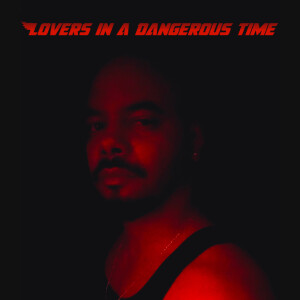
Thursday Feb 13, 2025
Thursday Feb 13, 2025
Since 1986, when Zapp & Roger wired romance into Computer Love, and 1995, when the first online dating site flickered to life, we've been spiraling deeper into a Love Apocalypse. The heart’s been hacked, the game’s been gamified, and love? Well, love's been left buffering.
In this Valentine’s Day special, Aharon charts the digital contagion—how swiping right became a reflex, ghosting turned ritual, and trolling one’s crush became an advanced flirting strategy. How did we go from checking for tender-roonis to tinder-roonis? From waiting nervously at a café for a blind date to being catfished for a calendar year (apologies to Manti Te’O)? People can’t even tell if it's Valentine’s Day or Halloween anymore—ghosting got them shook.
But don’t worry, love warriors. We’ve got strategies to debug the heart and reclaim romance from the algorithmic abyss. With live performances from Aharon & the Love Savers, poetry from our own A. Love, and deep insights from Professor Jemer, the Love Anthropologist, this episode is a survival guide for those still searching for a signal in the static.
Love may be absent, but that doesn’t mean it’s forgotten.
Produced by Soker.
Music provided by TrethWest.
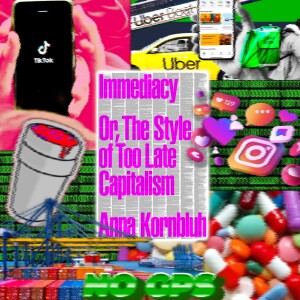
Saturday Feb 08, 2025
Saturday Feb 08, 2025
In this episode of NO GPS, Aharon and Mez throw the Uberized world into gridlock, pulling apart the topological thinking of Anna Kornbluh’s Circulation, the opening chapter of her book entitled 'Immediacy: The Style of Too Late Capitalism'. Kornbluh warns us about the flattening effects of disintermediation—the way late capitalism compresses space and time, eroding the critical structures that once made meaning possible. We no longer experience culture so much as we are immersed in it, drowning in immediacy, stripped of the distance necessary for reflection.
Aharon and Mez situate us in the murky waters of the post-to-the-postmodern moment—a time with no clear shape, no distinct historical texture. A horizon-less now, where everything—people, ideas, services, products—is reduced to raw exchange value. We don’t live in a society with an economy; we live in an economy that barely tolerates the presence of a society within it—an insight drawn from decolonial thinker Walter Mignolo.
But if the world has become one seamless, frictionless circuit, the guys propose a way out: the jam (a show stopping jam a la Michael Jackson & Michael Jordan). Whether physical or informational, they argue that disruption—traffic jams, logjams, algorithmic slowdowns—is the last available tool to fend off the anxiety, stress, and manic hyper-acceleration of contemporary life. The jam, they suggest, might be the only way back to something like a meaningful social life—a move away from Fred Moten’s blur and toward a space where mediation and thought can flourish again.
From psychoanalysis to political economy, geopolitics to future options trading, dream analysis to the gig economy, Juba, Sudan to hip hop’s origins in money-making Manhattan, and even Tenet’s time-twisting metaphysics—Aharon and Mez map out the contours of a world that is always moving and is always stuck in the now.
Produced by Soker
Music by TrethWest
Cover art (as always) by Matt J.
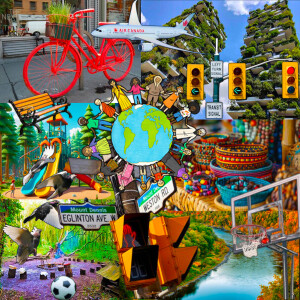
Friday Jan 24, 2025
Friday Jan 24, 2025
In this NO GPS After Sunset episode, we reimagine Weston-Mount Dennis not as a neglected periphery, but as "The City of Our Dreaming"—a title borrowed from the radical insights of Christina Sharpe's 2024 Alchemy Lecture Series. This is no ordinary retelling; it is a sonic and spatial Black history, reassembled and resurrected to defy the dictates of Empire.
We dismantle the colonial narratives that reduce this territory to urban blight, flipping the script to unveil an emancipatory geography rooted in care, community, and the audacious brilliance of radical imagination. Each act of the episode layers scholarship, music, and storytelling to craft an interconnected vision of the future—one where education, architecture, and economies of reciprocity form the bedrock of liberation.
Guided by Saidiya Hartman's critical fabulations and the transformative power of utopian dreaming, this episode doesn’t just tell history; it remakes it. Absence becomes presence, melancholia transforms into resilience, and Black life transcends the constraints of Euro-modernity to flourish as it was always meant to—unbound, unapologetic, and alive with possibility.
This is NO GPS After Sunset at its most daring: an offering of liberation and renewal for a territory that refuses to be forgotten. Tune in, and let us build a world where dreaming itself becomes a radical act of creation.
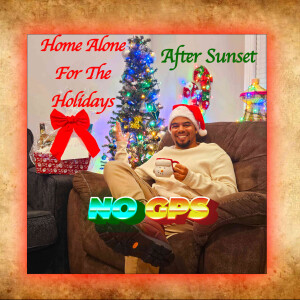
Saturday Dec 14, 2024
Saturday Dec 14, 2024
What if Home Alone is more than just a holiday staple, more than the merry slapstick marathon we’ve come to cherish each Christmas season? What if Kevin McCallister’s battle for survival—armed only with his wits, an arsenal of improvised 1930s innovations, and a rebellious spirit—mirrors the existential loneliness of our age of hyperconnectivity?
In this updated version of my Christmas scripted audio musical podcast, I revisit Home Alone as an unlikely metaphor for self-tutelage and self-mastery in the face of abandonment—by parents, by the state, by society. From the haunted yet hopeful nostalgia of my childhood in Apartment 710 on the Southside of Jane Street to the barren streets of a Mike Harris-era Toronto, I connect Kevin’s lonely yet inventive struggle to our shared navigation of a neoliberal world where we’ve been left to fend for ourselves.
This is not a tale of mere survival. It’s a story of transformation. Of Hip-Hop’s birth in the ashes of abandonment. Of finding harmony in cultural difference. Of using metaphor as the royal road to the collective unconscious. It’s a story of the mind’s ability to grasp itself, and the promise of a future where our minds can grasp each other’s.
Join us as we uncover the hidden genius of Home Alone—a Christmas classic that resonates far beyond the snow-globe fantasy of the McCallister mansion. And remember: the connection is already made. My mind to your mind. Merry Christmas, ya filthy animals.
Produced by: Matt & Aharon
Written by: Aharon
Music provided by: TrethWest
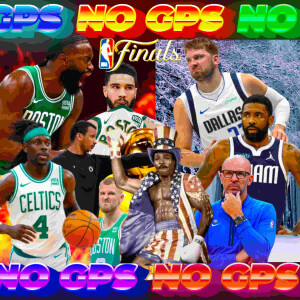
Monday Nov 04, 2024
Monday Nov 04, 2024
Recorded during the heat of summer, Mez, Matt, & Aharon bring you a special NO GPS episode that’s been waiting for just the right moment to hit your ears. With the NBA Finals and the U.S. elections on everyone’s mind, we thought—why not bring the worlds of sports and politics together? From game-deciding shots to culture-shaping trends, this episode is a snapshot of our collective anticipation and excitement. Now, as election day nears, our playoff analysis and predictions resonate with a new meaning, showing just how much the game on the court mirrors the game off it. Tune in and see where the Celtics’ victory and our “election forecast” collide in a blend of basketball insight and political intrigue.
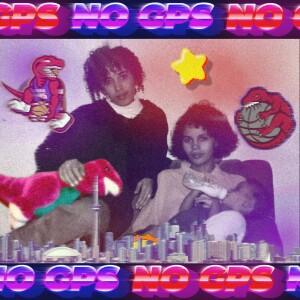
Sunday Oct 06, 2024
Sunday Oct 06, 2024
In this first episode of a three-part series, we take a unique and innovative look at how city life, professional sports, and popular culture intertwine to shape narratives about citizenship, individuality, and community. Through the lens of the Toronto Raptors’ rise, this podcast explores what it means to belong—both as a fan and as a member of a city that’s finding its voice. In preparation for Vince Carter’s jersey retirement at Scotiabank Arena, we reflect briefly on his legacy, but the real focus is on reimagining these themes in fresh, novel ways. Stay tuned for the next two episodes, as we continue to unravel these stories in ways you’ve never heard before.
Produced by Matt J.
Written by Aharon
Music by TrethWest
Art by Matt J.
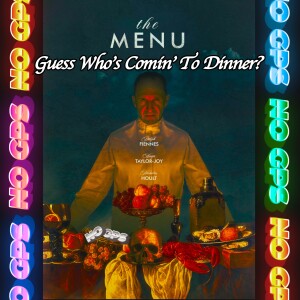
Monday Sep 30, 2024
Monday Sep 30, 2024
Originally set to release in January, this episode of NO GPS dives deep into the biting satire of the film The Menu, unraveling its critique of class, capitalism, and the art world. Mez, Matt and Aharon explore how the movie captures the widening gap between the rich and the working class, a world where the only time the "haves" and "have-nots" interact is when the elite are being served. It’s no wonder that the restaurant becomes the perfect scene for a class reckoning. The podcast also touches on the profound shift from labor exploitation to societal neglect—today’s workers aren’t merely exploited; they’ve become invisible, marginalized by a system that strips them of value.
The guys also discuss how The Menu mirrors our world’s obsession with scarcity and exclusivity, particularly in the realm of food and art. The film’s critique of hustle culture and capitalism's hollow promises is clear: the rich have time to become specialists in meaningless pursuits, while those who serve them struggle to survive. Both groups struggle with the same issue: a lack of meaning and purpose outside of production, circulation and consumption. Ultimately, The Menu offers a chilling reflection of the current Euro-American soul — a soul that has gotten itself lost in a Maze of profits and cheap thrills, leaving art, creativity, and human connection starving for meaning.
Time stamps for The Menu:
0:50 - Intro
2:33 - Ralph Fiennes is in this movie?!
3:00 - Spoiler Alert
3:35 - A post-Covid era movie that got turned into a cult classic
4:10 - A critique of the uneasy critique of the relationship between art & commerce
4:40 - Aharon is an artist? Yup, one that does it because he loves it, not because he receives sustenance from it
5:15 - The writers for the Onion wrote this? Everyone is a performance artist now, even New York City Mayor Eric Adams.
6:00 - This movie gives insight into the world of super scarce food that the global rich enjoy. Things like molecular cooking.
6:50 - the mega wealth and cultural gap between the super rich and the rest of us is symbolized in the movie by the austere and monastic lifestyle of the workers/servers and the restaurant’s patrons who live lifestyles Robin Leach couldn’t even fathom
7:57 - Fanboys are killing the mystery of art by exposing all of the secrets to greatness
8:50 - The consumer eventually becomes the consumed
9:20 - Scarcity creates value in this era of too late capitalism. The world is becoming a dessert
10:34 - This is a film that gives you insight into the current American soul
13:40 - Artist’s need the basics of life to be covered to create good art - but do they need the type of capital that big studios provide for this?
16:40 - Hustle culture - the global rich have an excess of time, hence they become specialists in things that do not give society, on a whole, value, at least for humans. And the meaning they derive is taken from those who must work endlessly for their daily bread
17:25 - We all need to get a life - we work to live we should not live to work
18:08 - The film examines subjects, both rich and poor, who live without meaning
18:50 - Working to enrich the soul, not one’s pockets (Poiesis)
19:08 - The people that serve the global rich live nowhere near the places they work. They exist on the edge of the cities - hence, the only time they can address a class conflict is at the site, the work site, where one works
20:35 - Economic segregation - and why is Chef Slowik quoting Martin Luther King’s ‘Letter from Birmingham City Jail’?
22:00 - The workforce, the cooks, are themselves a cult because it is the only outlet of meaning in a world that stripped them of value so ruthlessly. The sacred has been stripped of meaning by capital
22:40 - The service class themselves are going through their own delusions and mythmaking to give themselves meaning - even if it deals with them getting revenge in the most heinous way against their elite overlords
23:15 - The situation the film reveals is one where workers are no longer workers but are serfs that pay rent and receive none of the value they create. Hence, the horror that is revealed is that Capitalists are no longer capitalists, but are rather feudal lords
23:45 - Venture Capitalists can get wicked with it. No angels in their investments
24:50 - Margo aka Erin figures it all out. The oldest profession and its practitioners see the truth and hypocrisy of the world before we all do
26:40 - Cheeseburgers with American cheese will Make America Great Again
28:00 - The Chef comes back to his roots - the place that makes America possible: Waterloo (Iowa). Historical link to the battle of Waterloo that ushered in a century of peace in the Euro-American world. A cheeseburger is the symbol for this return to the thing that makes one Great, again
28:50 - Losing the American soul
29:50 - Aharon gives his advice on how to make art that has soul
30:30 - Who will pay for good art in a middle-classless world? The real customers for elite art are the elites
32:00 - We’ve entered a truly Gilded Age - the public can no longer support art made by artists that make art for the public
33:30 - The difference between the performance, the labor and the work
34:35 - Shout out to the show ‘The Bear’
35:10 - We live in a time when a lot of popular media being made these days makes fun of the rich - the rich laugh at us laughing at them..
36:15 - Cultural anhedonia has taken hold - pain, in a world filled with fake smiling faces trying to sell you something, is the only thing that can mark you as being real. This is the real function of horror as a genre in this era of too late capitalism
39:00 - With this film Mark Mylod shows us the emptiness of his subjects
41:10 - The guys dream of returning back to Eritrea and making chic exclusive food from cactus pear
42:10 - The guys finally admit they are looking for venture capital to make their art full time lol
43:05 - Outro
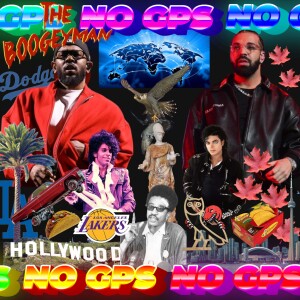
Saturday Jul 13, 2024
Saturday Jul 13, 2024
"You run to Atlanta when you need a check balance, Let me break it down for you, this the real nigga challenge" - Kendrick Lamar
"See it's no in between: you're either free or a slave" - H. Rap Brown
In one of this podcast's favourite articles, On the Question of Nigga Authenticity, Ronald T. Judy writes:
"The nigga is constituted in the exchange of experience for affect. This is not identical with the bad nigger who jeopardized community by insisting on having unmediated free experience. Such an insistence requires an essential innocence of identity, a way of understanding experience that is simply impossible right now. A nigga forgets feelings, recognizing, instead, that affects are communicable, particularly the hard-core ones of anger, rage, intense pleasure. One can belong with millions of others in an asynchronic moment of consumption of the same affect, the same passion. This is not empathy. The possibility of the nigga rests on the twofold of experience and affect, and the fact that experience is essentially unfungible; it cannot be sold as is but must be abstracted and processed by the formulaic functions of transnational capitalism. Knowing this, the hard-core gangster rapper traffics in affect and not values. In this sense, hard-core rap is the residual of the nonproductive work of translating experience into affect—it is pulp fiction, drawing into its web all the real nigga experiences it can represent in the affective constitution of niggaz."
In the decades since its publication, global capitalism's wholesale consumption of Judy's hardcore nigga has been completed. Maybe many times over. Processed and reformed to the point it has achieved a smooth exterior. A cutting edge that glows in the dark. Caramelised product that goes down better than ever before. But in order to keep reforming and fine-tuning itself so as to be the perfectly malleabe ready-to-eat sedative, it has to keep returning to take a dip into a real that is inexhaustible in its output of authentic experience. An endless reserve of curdled black experience that it can whip into affect to sell back to the consumer as narcotic pleasure. Drizzy Drake knows a truth about authenticity, namely, that it doesn't need to pass for the real thing as much as it needs to pass for passing. Black (in)authenticity performed long enough, repetitively enough, has become browness' rite of passage and Drake understands that if black experience is unfungible, black affect is the gold standard of the cultural foreign exchange market. Drake isn't so much driven by, and driving forward, the question "what is it like to be black?" as much as the question "what is it like to act black"? Hence the modern day consumer reads the couplet black+rap as ontologically stitched together, and therefore takes it for granted, while being eternally kept from asking the perhaps more pertinent questions : What is brown authenticity? Where is the line between the unfree and the not-a-slave? How would "rapping like freeing the slaves" look and sound like in brown and how would it fare in a free market of exchange when there was no taxes levied on the very concept that is rap's likeness? What is the residual affect of the non-productive work of the non-white and non-black translating black experience? What is the upshot of a double negative that shops down south? How do they rap in H-Town? Say Drake! What is it like to rap brown?
Produced by Matt J.
Music by TrethWest
Art by Matt J.
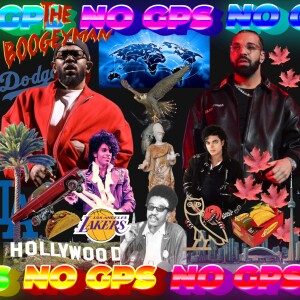
Thursday Jul 04, 2024
Thursday Jul 04, 2024
Today's episode is the one you didn't know you were waiting for! Mez, Matt, and Aharon do an in-depth analysis of the rap beef between Compton's "home is not where the heart is" Kendrick Lamar and Toronto's "placeless" hit-making global superstar Drake.
This seemingly juvenile rap beef has laid the foundation for an audit of Hip-Hop after over 50 years of its existence. Surprisingly, this audit—or rather, revelation—has emerged from the unlikely places of Toronto and London, England. German philosopher G.W. Hegel tells us that the philosopher arrives at the end of an epoch to make sense of its many paradoxes and ironies, not before or midway. This person, akin to Athena’s Owl of Minerva (it seems Toronto is home to more than one kind of OWL), can interpret the world of meanings often lost to us. For this instance, we call this person Hip-Hop’s Last Philosopher.
This rap beef has signalled the official end of George Bush Sr.'s New World Order and a return to history with its many geopolitical fault lines—apologies to Fukuyama. The era of prioritising interests over ideology is officially over. This was a period where the individual was fashioned to be a jet-setting, the-world-is-my-backyard, free agent of infinite possible identifications. Now, the lines are being drawn in the sand, brown sand, once again. Apologies to Rakim, but it's no longer "where ya at"; it's back to "where are you from?" Like the rise of ancestry tests, the worlds of culture, politics, sports, and entertainment are increasingly concerned with where your allegiances lie and what your values are.
Additionally, the guys discuss the disastrous effects that globalisation had on local LA and Toronto neighbourhoods post-NAFTA. This rap beef has cast Drake as a rootless and feckless agent of extractive globalisation, with his parade of accents and affiliations, while positioning Kendrick as the local agent of neighbourhood revitalization and grassroots advocacy. To understand this better, let's take a historical journey.
In the 1980s, downtown LA and the West Hollywood movie studios were pivotal sites for post-Cold War globalisation, particularly focused on receiving investment from the Asian Pacific, particularly Japan (the second biggest investor in the LA county region at the time were firms coming from Canada). This led to the global economic integration of various industries on the West Coast and the American Midwest, resulting in deindustrialization and joblessness for many white Americans, who now suffer through the opioid crisis. Meanwhile, on the other side of town (word to Tony Toni Tone - and it does rain in southern California, figuratively speaking), globalisation took on a different form.
The introduction of the globalised trade of crack cocaine marked a black market integration into the world economy, starting in LA through figures like the real Rick Ross. This not only exported dangerous street drug commodities but also the vehicles for selling them—namely, the set formations of local LA street gangs. Ice Cube's 1991 song "My Summer Vacation" perfectly describes this late 80s to early 90s phenomenon of exporting brother-on-brother violence and its associated Scarface cocaine dreams. By 2005, this form of integration in the global economy via crack cocaine, originating in South Central LA, was distributed through Crip and Blood sets across America and eventually the globe.
A street documentary entitled "The Real Toronto," released in 2005, showcased the interrelated relationship between these distant geographies. A similar sense of boundedness and territorial identity formation was developing in Toronto's black neighbourhoods, even as a global ethos of borderlessness and openness was being embraced. This culminates when a young black Toronto teen states in the documentary: "If you take a good look around the block, it’s like two squares and a square on that side, and then a square on this side. …The government, that’s how they control us. They box us in.” We highlight this not to sow division but to make our interconnectedness clear.
Lastly, the whole world has seemingly been sprayed with an unplaceable colour of Kim Kardashian like-brown. It seems everybody wants to be brown now. Yet, I can remember a young Brandy Norwood in 1994 singing that she wanted to be down. A specific way that particular demographics in the Black Atlantic would describe a type of black communal solidarity. But in 2024, the whole world has replaced the world down with the word brown. Not just any type of brown. A Michael Jackson ‘I can be from anywhere so guess my ethnicity’ type of brown. Michael Jackson from the Martin Scorsese directed music-video/short film Bad type of brown. A figure who is for everybody because he is not particularly for anybody. An individuated agent whose origins are untraceable. A being who is a guest in their own body. The perfect amorphous agent for the type of unfettered free market fundamentalism (only for the overdeveloped nations) that globalisation unleashed on unsuspecting populations all around the world - populations of people who just wanted to be seen and acknowledged. Who just wanted to be down. Michael Jackson started it all - and now we have a coterie of brownified global superstars that someone from Afghanistan or the Dominican Republic can identify with. But this is only a skin deep connection - it doesn't tie in to that person's indigenous real-non-virtual-world social, cultural, political realities and histories. Fanon already wrote a book called Black Skin, White Masks. So I need not explain further on the point. But let me say this, the mask is now brown and it is not only black folks wearing the masks - everybody's in on the jig now. Nevertheless, if we take the metaphor between the two rappers (Kendrick identifying himself with Prince and Drake identifying himself with Michael Jackson) seriously, then, it may be 37 years too late, but we finally have our promised battle between two music industry heavyweights (remember - not the time - that Prince was initially casted to star in Jackson's Bad video in the role played by Wesley Snipes).
Come take a ride with the guys from NO GPS, with NO GPS!
Time Stamps:
0:00:34 - Intro
0:2:18 - Toronto as a seminal Hiphop city
10:56 - Sandman Negus
13:45 - City of Quartz - LA as the launchpad for Globalisation
17:28 - Exporting gang violence
23:32 - Drake & Kendrick
27:07 - The electrifying and pacifying effects of LA & Toronto music & inauthenticity
38:05 - The 2008 connection between Obama, Kanye West & the great financial recession
43:04 - Obama
45:03 - Drake's Story
48:42 - The Eminem effect
51:34 - Drake's conquering of the USA-centric Rap Industry, why he moved to the US & claims of being an agent of colonization
58:03 - Outro
Produced by Matt J.
Music by TrethWest
Art by Matt J.
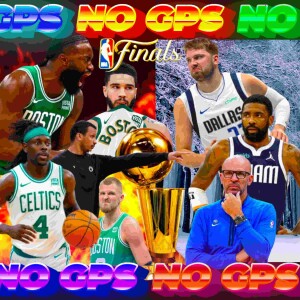
Tuesday Jun 11, 2024
Tuesday Jun 11, 2024
Mez, Matt & Aharon are back again with commentary and breakdowns of the first two games of the NBA Finals featuring the Dallas Mavericks and Boston Celtics.
They talk about what went right for the Celtics, who are up 2-0, and what went wrong for the Mavericks.
The guys even discuss Boston sports culture and Aharon's weird connection to it this particular year (he lost a bet and had to forsake his beloved Toronto Blue Jays and watch 50 percent of the Boston Red Sox's regular season games for the 24-25 season). As a long time Boston and New England sports hater he has come to appreciate the sports fluency of the region and has learned a thing or two about dynasty building (no joke).
At the end of the episode Mez reveals that the guys will continue to cover basketball into the summer - with a special focus on the WNBA. He gives Aharon 2 teams to watch (one from the east and another the west). So look forward to the guys covering the W!
Time Stamps:
00:46 - Intro
03:56 - Jrue/KP - Luck of the Irish
05:23 - Dallas off their gameplan
09:39 - KP's Value
11:20 - Dallas' Defense
13:33 - Boston's Greatness/Boringness on their Way to Victory
17:45 - Love for Boston?
20:13 - Game 3 Expectations
26:58 - Jaylen Brown. the Boston system & how players fit into it
28:32 - Boston's Very Long Journey to the 2024 NBA Finals
29:59 - Closing Remarks & Predictions
Produced by Matt J.
Music by TrethWest
Art by Matt J.






